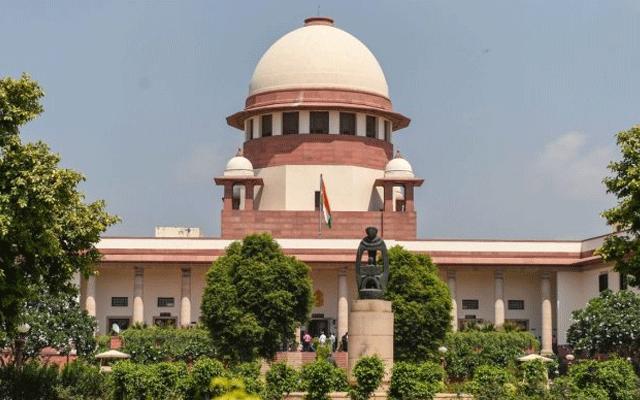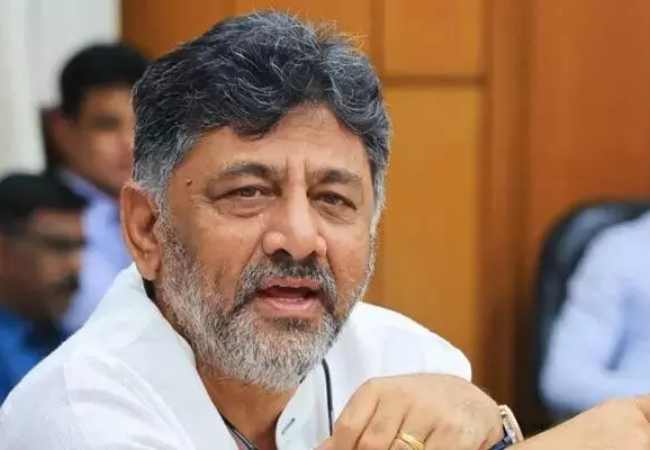New Delhi: Persons in illegal occupation of government or panchayat land cannot claim regularisation as a matter of right, the Supreme Court has said.
A bench of Justices D Y Chandrachud and M R Shah said regularisation of the illegal occupation of government or panchayat land can only be as per the policy of the state government and the conditions stipulated in the rules.
The top court was hearing a plea filed by residents of Sarsad village in Tehsil Gohana in Haryana's Sonepat district who encroached upon panchayat land and constructed houses.
The Haryana government in 2000 framed a policy regarding sale of panchayat land in unauthorised possession outside 'Abadi Deh' (the residential area of a revenue estate).
Haryana also amended the Punjab Village Common Lands (Regulation) Rules, 1964 and issued a notification in 2008.
Thereafter, in 2008, Rule 12(4) was incorporated in the 1964 Rules in terms of the notification dated January 3, 2008, which authorises Gram Panchayat to sell its non- cultivable land in Shamlat Deh (vacant land) to the inhabitants of the village who have constructed their houses on or before March 31, 2000.
The petitioners in this case, who were in illegal possession of the land belonging to Gram Panchayat, made an application under Rule 12(4) of the Punjab Village Common Lands (Regulation) Rules, 1964.
The Deputy Commissioner, Sonepat on perusal of the record and the site report, rejected their application holding that as the applicants are in illegal occupation of the area more than the required area up to a maximum of 200 square yards, they are not entitled to the benefit of Rule 12(4).
The Punjab and Haryana High Court dismissed a writ petition challenging the order passed by the authority.
The apex court held the competent authority as well as the high court both are justified in taking the view that as the respective petitioners are in illegal occupation of the area more than the required area up to a maximum of 200 square yards, they are not entitled to the benefit of Rule 12(4).
"It is required to be noted that the persons in illegal occupation of the Government Land/Panchayat Land cannot, as a matter of right, claim regularization.
Regularisation of the illegal occupation of the Government Land/Panchayat Land can only be as per the policy of the State Government and the conditions stipulated in the Rules, the bench said.
The top court said that if it is found that the conditions stipulated for regularisation have not been fulfilled, such persons in illegal occupation of the government or panchayat land are not entitled to regularisation.
Let the Truth be known. If you read VB and like VB, please be a VB Supporter and Help us deliver the Truth to one and all.
Bengaluru (PTI): Karnataka has proposed a new Information Technology Policy for 2025–2030, offering extensive financial and non-financial incentives aimed at accelerating investments, strengthening innovation and expanding the state's tech footprint beyond Bengaluru.
The Karnataka Cabinet gave its nod to the policy 2025–2030 with an outlay of Rs 445.50 crore on Thursday after the Finance Department accorded its approval.
The policy introduces 16 incentives across five enabler categories, nine of which are entirely new, with a distinctive push to support companies setting up or expanding in emerging cities.
Alongside financial support, the government is also offering labour-law relaxations, round-the-clock operational permissions and industry-ready human capital programmes to make Karnataka a globally competitive 'AI-native' destination.
According to the policy, units located outside Bengaluru will gain access to a wide suite of benefits, including research and development and IP creation incentives, internship reimbursements, talent relocation support and recruitment assistance.
The benefits also include EPF reimbursement, faculty development support, rental assistance, certification subsidies, electricity tariff rebates, property tax reimbursement, telecom infrastructure support, and assistance for events and conferences.
Bengaluru Urban will receive a focused set of six research and development and talent-oriented incentives, while Indian Global Capability Centres (GCCs) operating in the state will be brought under the incentive net.
Incentive caps and eligibility thresholds have been raised, and the policy prioritises growth-focused investments for both new and expanding units.
Beyond incentives, the government focuses on infrastructure and innovation interventions.
A flagship proposal in the policy is the creation of Techniverse -- integrated, technology-enabled enclaves developed through a public-private partnership model inside future Global Innovation Districts.
These campuses will offer plug-and-play facilities, artificial intelligence and machine learning and cybersecurity labs, advanced testbeds, experience centres, and disaster-resistant command centres.
There will also be a Statewide Digital Hub Grid and a Global Test Bed Infrastructure Network, linking public and private research and development, and innovation facilities across Karnataka.
The government has proposed a Women Global Tech Missions Fellowship for 1,000 mid-career women technologists, an IT Talent Return Programme to absorb experienced professionals returning from abroad, and broad-based skill and faculty development reimbursements.
Shared corporate transport routes in Bengaluru and tier-two cities will be designed with Bengaluru Metropolitan Transport Corporation and other transport entities to support worker mobility.
The government said the policy is the outcome of an extensive research and consultation process involving TCS, Infosys, Wipro, IBM, HCL, Tech Mahindra, Cognizant, HP, Google, Accenture and NASSCOM, along with sector experts and stakeholder groups.
It estimates an outlay of Rs 967.12 crore over five years, comprising Rs 754.62 crore for incentives and Rs 212.50 crore for interventions such as Techniverse campuses, digital grid development, global outreach missions and talent programmes.





